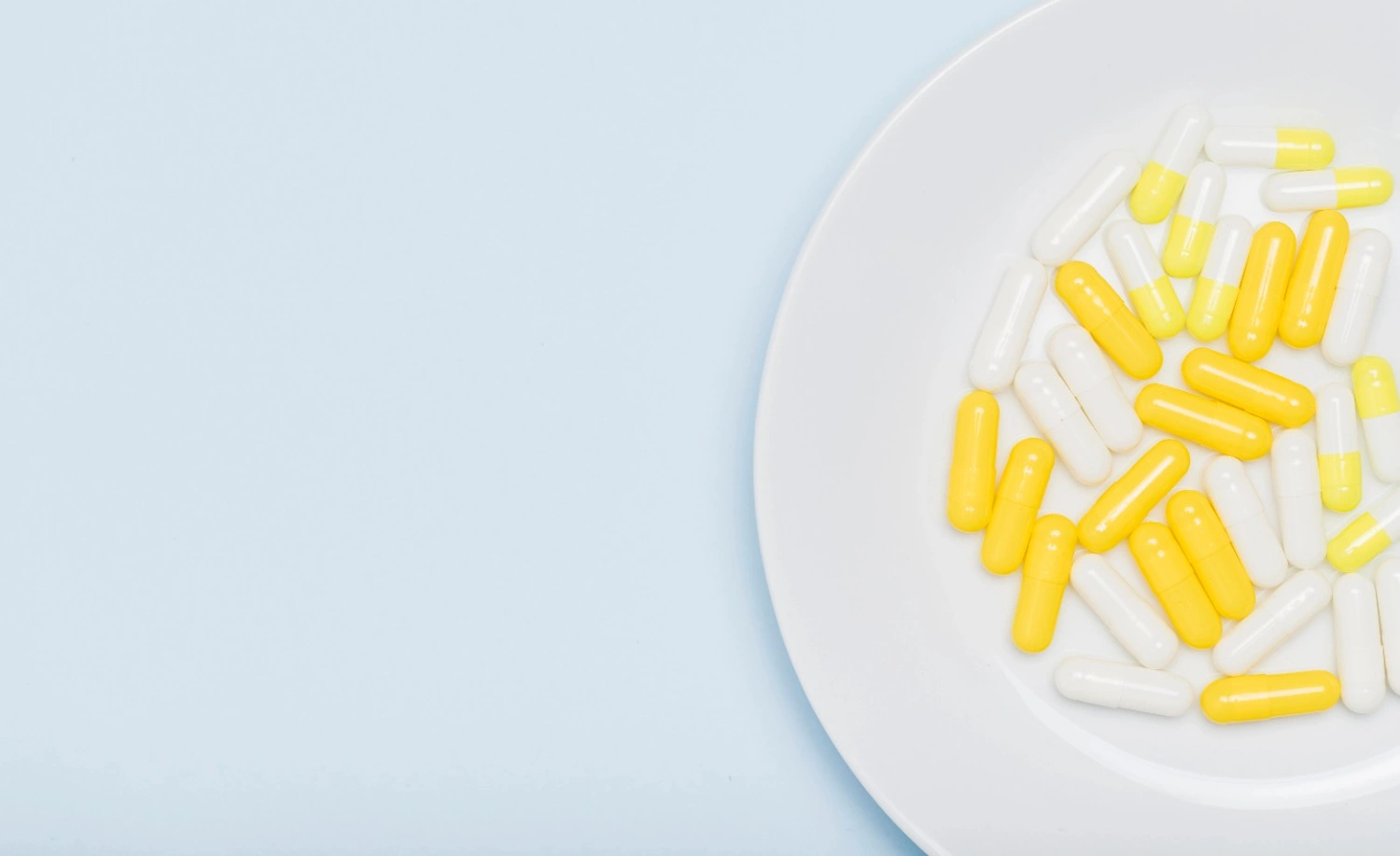Table of Contents
Berberine is a plant-based compound long used in traditional medicine, while Berberine HCl is the hydrochloride salt form most often found in supplements.
Both have similar health benefits, but Berberine HCl is more soluble, better absorbed, and more thoroughly researched.
Understanding the difference can help you choose the right form for your health goals.
Key Summary:
-
Berberine is the natural active compound found in several plants.
-
Berberine HCl is a more soluble and widely used salt form for supplements.
-
HCl form is better researched, with higher absorption and stability.
-
Both are used for blood sugar, cholesterol, and metabolic health.
What Is Berberine?
-v1756431353015.webp) Berberine is a natural alkaloid compound found in plants such as barberry, goldenseal, and Oregon grape. It has been used in Chinese and Ayurvedic medicine for centuries to support digestion, fight infections, and regulate blood sugar.
Berberine is a natural alkaloid compound found in plants such as barberry, goldenseal, and Oregon grape. It has been used in Chinese and Ayurvedic medicine for centuries to support digestion, fight infections, and regulate blood sugar.
Modern research has confirmed many of these traditional uses. Berberine helps the body by activating an enzyme called AMPK, which plays a role in energy balance, metabolism, and insulin sensitivity.
Studies suggest it may help reduce blood sugar, improve cholesterol levels, and support gut health (1).
When a supplement label simply says “berberine,” it usually refers to the active compound itself, but the actual form can vary.
Some supplements use raw berberine extracts, while others use processed salts like Berberine HCl to improve stability and absorption.
What Is Berberine HCl?
Berberine HCl, or berberine hydrochloride, is a salt form created by combining berberine with hydrochloric acid. This makes it more water-soluble and easier for the body to absorb than plain berberine.
Because of its solubility, Berberine HCl has become the most common form used in supplements and clinical research.
When people talk about taking “berberine” capsules for blood sugar or cholesterol, they are usually taking Berberine HCl.
This form is also easier to standardize, meaning supplement makers can guarantee a consistent dose.
Most studies on berberine’s health effects, from lowering blood sugar to improving lipid levels, have been conducted using Berberine HCl.
Berberine HCl vs. Berberine: Key Differences
The main difference is that berberine is a natural compound, while Berberine HCl is a processed salt form designed for better solubility and absorption. Most supplements and research studies use Berberine HCl because it is easier for the body to use effectively.
Here’s a quick comparison table:
Now let’s break these differences down in more detail.
1. Chemical Form
Berberine is the raw alkaloid found in plants, while Berberine HCl is created by attaching hydrochloric acid to the molecule.
This chemical tweak does not change berberine’s function but makes it easier to handle in supplements.
2. Solubility and Absorption
Plain berberine does not dissolve well in water, which makes it harder for the body to absorb.
By contrast, Berberine HCl dissolves easily, meaning more of it can enter the bloodstream and reach target tissues. This is why supplements almost always use the HCl form.
3. Research and Clinical Studies
Most scientific studies testing berberine’s effects on blood sugar, cholesterol, and weight management have been done with Berberine HCl.
While the benefits come from the same active compound, research favors the HCl form because it delivers more consistent and reliable results.
4. Supplement Labels and Practical Use
If you buy a supplement labeled simply “berberine,” chances are it contains Berberine HCl. Manufacturers use this form for its stability and proven results.
Raw berberine powders exist, but they are less common and less studied. Checking the supplement facts panel is the best way to know which form you are getting.
Which One Works Better?
 Berberine HCl generally works better than plain berberine because it dissolves more easily in water and is absorbed more efficiently by the body. This means the active compound can reach the bloodstream in higher amounts, making supplements more effective.
Berberine HCl generally works better than plain berberine because it dissolves more easily in water and is absorbed more efficiently by the body. This means the active compound can reach the bloodstream in higher amounts, making supplements more effective.
While both forms contain the same active ingredient, research overwhelmingly favors Berberine HCl.
Most clinical trials have used the HCl form, showing reliable benefits for blood sugar control, cholesterol levels, and weight management.
Plain berberine can still work, but it is less predictable since absorption is weaker and less studied.
Health Benefits Backed by Research (Primarily Berberine HCl)
 Most of the proven benefits come from studies on Berberine HCl. Research has highlighted its role in several areas of health:
Most of the proven benefits come from studies on Berberine HCl. Research has highlighted its role in several areas of health:
Blood sugar regulation – Studies have found that Berberine HCl can lower fasting blood sugar and HbA1c levels, sometimes working as effectively as metformin for people with type 2 diabetes (2).
Cholesterol and triglycerides – Clinical trials show that Berberine HCl helps reduce LDL cholesterol and triglycerides while raising HDL (“good”) cholesterol, supporting better heart health (3).
Weight management – Some studies suggest Berberine HCl may aid in weight loss by improving metabolism and reducing fat storage in people with obesity or metabolic syndrome (4).
Gut health – Research indicates berberine can help balance gut bacteria and reduce inflammation, which may benefit digestion and overall immunity (5).
Anti-inflammatory effects – Animal and human studies show that berberine reduces markers of inflammation, which may play a role in lowering chronic disease risk (6).
Dosage and How to Take
 Most studies use 500 mg of Berberine HCl, taken two to three times daily with meals. Splitting the dose helps maintain steady levels in the bloodstream and reduces stomach upset.
Most studies use 500 mg of Berberine HCl, taken two to three times daily with meals. Splitting the dose helps maintain steady levels in the bloodstream and reduces stomach upset.
When a label says only “berberine,” it often still refers to Berberine HCl, but it’s wise to check.
Supplements usually come in 500 mg capsules, and many experts recommend cycling use after several months rather than taking it nonstop for years.
Always consult a healthcare provider before starting, especially if you are on medication.
Risks and Side Effects
Berberine HCl is considered safe for most healthy adults, but it can cause mild digestive issues, especially at higher doses or when first starting.
Common side effects may include:
Stomach cramps or bloating
Constipation or diarrhea
Nausea or upset stomach
Headaches or dizziness (less common)
Berberine can also interact with certain medications, including diabetes drugs, blood thinners, and cyclosporine.
Pregnant and breastfeeding women should avoid it, as safety has not been established. Talking with a doctor before use is the best way to avoid complications.
Conclusion
Berberine and Berberine HCl share the same active compound, but the HCl form is easier to absorb, more stable, and better studied.
That’s why most supplements and clinical trials use Berberine HCl rather than plain berberine.
If you’re looking for reliable results with blood sugar, cholesterol, or metabolism, choosing a supplement labeled as Berberine HCl is usually the smarter choice.
FAQs
Is Berberine HCl stronger than plain berberine?
Yes. Berberine HCl dissolves better in water and is absorbed more efficiently, making it more effective than plain berberine.
Can I just take natural berberine powder instead of HCl?
You can, but absorption will be lower and results may be less predictable. Most supplement brands prefer Berberine HCl for consistency.
Why do most supplements use Berberine HCl?
Because it is more soluble, better absorbed, and easier to standardize in capsule form, which makes dosing reliable.
How long does it take for berberine to work?
Studies suggest it may take 2 to 3 months of regular use to see noticeable improvements in blood sugar or cholesterol.
Is it safe to take Berberine HCl daily?
Yes, for most healthy adults, but it’s best taken in cycles and under medical guidance. Pregnant or breastfeeding women and people on certain medications should avoid it.



